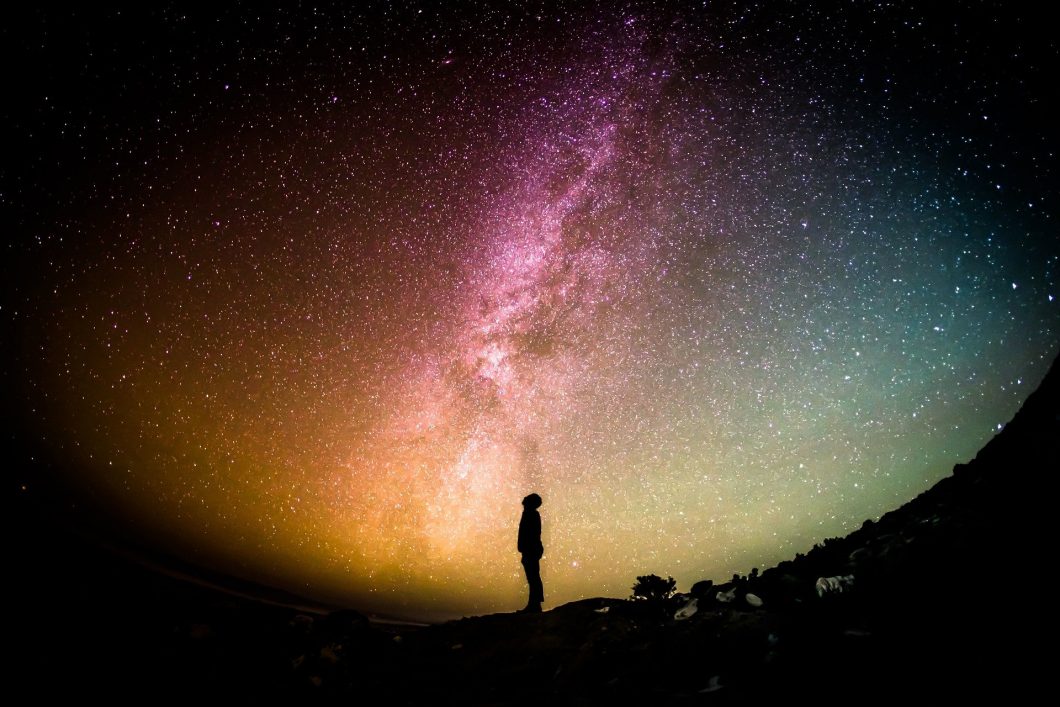In Search of Meaning
What is the meaning of life? What gives life meaning? What does ‘meaning’ mean to you?
It feels like I have always been asking these deeper questions, but it is only now, as I cross the threshold into the second half of life (and I am taking 50 as the half-way mark!), that my desire to find answers to these questions is becoming more relevant! I do not yet feel that time is running out, but I do have a greater sense of urgency to pursue the holy grail of meaning and purpose before the final grains of sand slip through the narrow passageway of life’s hourglass. Surely meaning, once found, is something to savour and enjoy? It would be a shame to leave it too late to discover the meaning of my existence!

Starting the Search
Where do we look for the meaning of ‘meaning’? Books, podcasts, other people’s lives? Careers, roles, responsibilities? Relationships, accomplishments, success?
Is meaning something we find, something we do or something we are?
I am not alone in my search for meaning. To help me find some answers, I start my exploration with one of my favourite books ‘Man’s Search for Meaning’ by Dr Viktor Frankl.
Dr Frankl gives us a deeply personal account of his struggle for survival in Auschwitz and other Nazi concentration camps. He shares his journey to find meaning in the most extreme experience of horror, torture, fear, and brutality. In the second part of this book, Frankl gives a detailed account of the therapeutic approach that he developed – Logotherapy. Logos comes from the Greek word which denotes ‘meaning’. Frankl dedicated his life to helping others find meaning in theirs.
Frankl takes the view that this striving to find a meaning in one’s life is the primary motivational force. He goes on to explain that this search for meaning is not without inner tension and frustration. This ‘tension’ exists between what one has already achieved and what one still ought to accomplish, or the gap between what one is and what one should be. Without this tension, there is a void, an ‘existential vacuum’ that can impact negatively on our well-being. We all need something to strive for, to live for, otherwise life is meaningless. The quest for meaning is the key to health and human flourishing.
This makes sense when we think about the times in our lives when we lose some sense of meaning that previously existed. The kids leave home. We lose our job. We retire. Or some other life event opens up a space of nothingness. We feel lost. How do we find meaning again?
Frankl suggests that we reverse the question “What is the meaning of life”? and ask instead “What is life asking of me”? What are we being called to? This changes the focus and calls us to be an active participant in the search for meaning and fulfilment in our own lives.
Finding Meaning
Frankl proposed that the meaning of life “differs from man to man, from day to day and from hour to hour”. The meaning of life does not have one big mysterious answer that we need to search for. The meaning of life is found in the ever-changing ebb and flow of our existence, moment to moment.
Frankl believed that we could discover the meaning of life in 3 different ways:
- By creating work or doing a deed.
- By experiencing something (goodness, beauty, nature, truth) or encountering someone (experiencing another in their uniqueness ie loving them).
- By the attitude we take towards unavoidable suffering.
The Meaning of Suffering
There are some situations that are so tragic that they challenge us to consider any possible meaning they might hold. Frankl offers us the idea of ‘tragic optimism’ – optimism in the face of tragedy. He asks how we can remain optimistic in spite of the ‘tragic triad’ of pain, guilt, and death. From his personal experience and endurance in the concentration camps, Frankl demonstrates that life is “potentially meaningful under any conditions, even those which are most miserable”. He quotes Nietzsche
“He who has a why to live can bear almost any how”.
During his imprisonment in unimaginable conditions, Frankl thought about his wife, his parents, his work as a psychiatrist and the book he wanted to write. These all gave him meaning in the most tragic of circumstances.
Frankl’s approach calls for us to adopt a specific attitude, a ‘meaning mindset’, when faced with challenging situations that life throws at us. Unfortunately, this mindset appears to be lacking in many parts of our society today. With an ever-increasing dependence on anti-depressants, a rise in addictions; depression and suicide, something is missing from our lives? Are we devoid of meaning?
Most people have enough to live by, but many have nothing to live for. Many have means, but no meaning.
The Power Of Meaning
In her book “The Power of Meaning” Emily Esfahani Smith explores the search for meaning in a world obsessed with the search for happiness. She makes the distinction between a happy life and a meaningful life. Research shows that the search for happiness makes people unhappy! Happiness has to ensue. We have to search for a reason to be happy, not happiness for the sake of it.
The author shares the results of a study (Oishi and Diener 2014) in which 140,000 people across 132 countries were surveyed. The results showed that many people do not have a sense of what makes life meaningful. The study also showed that happiness or unhappiness did not predict rates of suicide. The variable that did was ‘meaning’ – or more precisely the lack of it. Wealthy countries, like Japan, with the lowest rate of meaning had the highest rate of suicide.
Going back in history it is clear that there has always been this search for meaning. The Greek philosopher, Aristotle, looked beyond happiness to what he referred to as the ‘eudaimonic life’.. a life that requires cultivating the best qualities within you, both morally and intellectually, and living up to your potential. It is an active life, a life in which you do your job and contribute to society, a life in which you are involved in your community, a life above all in which you realise your potential, rather than squander your talents.” The eudaimonic life is to be had whenever we are in pursuit of fulfilling our potential. That way, we find more meaning and purpose in life.
Another figure from history, Leo Tolstoy, also struggled with his search for meaning, despite his great achievements. From the depths of despair and the existential vacuum, he eventually went in search of people who had found meaning in their lives. He did not find these people in his own circle but amongst the “simple people”, the uneducated, the peasants, those who derived meaning from faith. Tolstoy’s midlife crisis led him back to religion and faith. Many people have found similar paths to meaning, through faith and spirituality.
But what about meaning for non-believers or those who have been sorely disappointed by the religious traditions they inherited? Emily Esfahani Smith asks, “Is it possible to live a meaningful life without relying on faith in something infinite, that gives our existence meaning?”
Her search resulted in an answer she calls the 4 pillars of meaning:
- Belonging – meaning we derive from our relationship to others.
- Purpose – Having a mission tied to contributing to society.
- Storytelling – Making sense of who we are through narrative.
- Transcendence – connecting to something bigger than the self.
Meaning derived from the above 4 pillars is accessible to everyone, with or without religion.
Connecting the dots………
One of the fundamental aims of Frankl’s logotherapy was to make people aware of our ‘responsibleness’. Man is responsible and must actualise the potential meaning of his life.
The meaning of life is different for each of us. It seems there can be an overall meaning for one’s life as a whole. But this can only be seen looking back…or as Steve Jobs said, ‘you cannot connect the dots looking forward, you can only connect them looking backwards”.
Frankl suggests the same and gives a great analogy when searching for both the overall meaning of life and the meaning of every hour or every day. He suggests we consider how a movie is made up of thousands of individual pictures and each one makes sense and carries meaning, yet the meaning of the whole film cannot be seen before its last sequence is shown. It is the same with life. We cannot understand the whole film (or our whole life) without having first understood each picture. The final meaning depends on whether or not the potential meaning of each single situation has been actualised to the best of the individual’s knowledge and beliefs.

It is up to each of us to find out makes life meaningful for us. In each moment. In each situation. That is our responsibility. While we might like to believe there is one great answer to the meaning of life, we must be satisfied with the knowledge that we all can, and must, find our own sources of meaning within life. As Viktor Frankl would say, that is our responsibility and in that lies our power and our freedom.
In the search for the meaning of life, look more closely at each moment. In the words of novelist Madeleine L’Engle:
“The only certainty is that we are here, in this moment, in this now. It is up to us to live fully, experiencing each moment, aware, alert, and attentive. We are here, each of us to write our own story”.


